|
|
|
Sort Order |
|
|
|
Items / Page
|
|
|
|
|
|
|
| Srl | Item |
| 1 |
ID:
168439
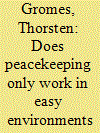

|
|
|
|
|
| Summary/Abstract |
Peacekeeping is widely considered to be an effective means of preventing civil war recurrence. However, as peace has collapsed in a considerable number of cases despite peacekeeping efforts, we are left with the question which combinations of peacekeeping environments and peacekeeping missions lead to lasting peace. This article compares 22 peacekeeping missions between 1990 and 2012. While prominent United Nations documents assume that the success of post-conflict peacekeeping primarily depends on the features of the mission itself, the analysis shows that characteristics of the terminated civil war have a strong influence on whether peace endures. Restrained peacekeeping, defined by low troop density, non-robustness, and a lead nation that is not a permanent member of the Security Council, only succeeds in preserving peace in conducive environments. Inconclusive war endings, evenly distributed military capabilities at war’s end, ethnic conflicts, and high intensity create a particularly difficult context for peacekeeping.
|
|
|
|
|
|
|
|
|
|
|
|
|
|
|
|
| 2 |
ID:
168438


|
|
|
|
|
| Summary/Abstract |
In 2004, the United Nations Security Council adopted resolution 1540, which acknowledged the non-state acquisition of weapons of mass destruction as a security threat and called on member states to implement “appropriate effective” domestic trade controls. The United States, however, has both promoted the multilateral implementation of strategic trade controls but has also increasingly resorted to extraterritorial enforcement of its counterproliferation rules. How can a multilateral, norms-based international regime like 1540 contend with extraterritorial enforcement based on national interests? We argue that increased U.S. extraterritorial counterproliferation policies are a consequence of the inconsistent implementation of resolution 1540, adaptive and resilient proliferation networks, and a history of expanding legal interpretations of jurisdiction. We find that while U.S. extraterritorial enforcement can effectively disrupt networks hiding in overseas jurisdictions, doing so creates disincentives for states to implement 1540 obligations and undermines broader nonproliferation objectives.
|
|
|
|
|
|
|
|
|
|
|
|
|
|
|
|
| 3 |
ID:
168437
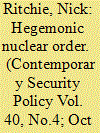

|
|
|
|
|
| Summary/Abstract |
The notion of a “global nuclear order” has entered the lexicon of nuclear politics. The 2017 Treaty on the Prohibition of Nuclear Weapons has prompted further questions about how we understand it. Yet missing from analysis of nuclear order and the “Ban Treaty” is a critical analysis of the power relations that constitute that order. This article develops a critical account of global nuclear order by applying Robert Cox's concept of hegemony and power to the global politics of nuclear weapons, drawing on the politics of the Ban Treaty. It theorizes a “nuclear control order” as a hegemonic structure of power, one that has been made much more explicit through the negotiation of the Ban Treaty. This fills a void by taking hegemony and power seriously in theorizing nuclear order, as well as explaining both the meaning of the Ban Treaty and its limits.
|
|
|
|
|
|
|
|
|
|
|
|
|
|
|
|
| 4 |
ID:
168440
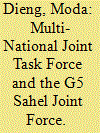

|
|
|
|
|
| Summary/Abstract |
The Multi-National Joint Task Force (MNJTF) and the G5 Sahel Joint Force are ad hoc counterterrorism task forces in the Lake Chad Basin and the Sahel region, respectively. These new task forces enjoy significant international capacity-building support, especially from France and the United States. This article shows that capacity-building actions, while fostering the operationalization of the MNJTF and the G5 Sahel Joint Force, nevertheless have several limitations. Capacity-building counterterrorism initiatives tend to favor security-focused strategies at the expense of efforts that could tackle the structural challenges that fuel terrorism. Such actions are also likely to incentivize dysfunctional practices on the part of security forces and political regimes in recipient countries. It is imperative for major outside players to work with African countries by promoting social and economic development projects, respect for civil rights and freedoms, as well as the community engagement of security forces.
|
|
|
|
|
|
|
|
|
|
|
|
|
|
|
|
| 5 |
ID:
168442
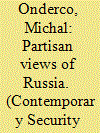

|
|
|
|
|
| Summary/Abstract |
The connection between Russia and European political parties has been in the scholarly and popular spotlight recently. While scholars focus on the connection between the far right (and populist) parties and Russia, they have all but ignored the rapidly increasing literature on the role of political parties in foreign policy. This article provides an attempt to bridge these literatures. After analyzing a corpus of party manifestos, the results suggest that there is temporal variation in how European parties have seen Russia since the end of the Cold War. European parties tended to be mostly positive in their views of Russia prior to 2015. Geography and ideology were much less important as a factor in explaining party positions. While some ideological groups share attitudes across different borders, the overall influence of ideology on attitudes toward Russia is minimal.
|
|
|
|
|
|
|
|
|
|
|
|
|
|
|
|
| 6 |
ID:
168441
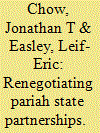

|
|
|
|
|
| Summary/Abstract |
Pariah status for violating international norms over decades increased Myanmar and North Korea’s dependence on China. Myanmar’s post-2010 reforms sought to reduce international sanctions and diversify diplomatic relations. North Korea pursued a diplomatic offensive after the 2018 Winter Olympics, but only after declaring itself a nuclear state. Why, despite both states’ politically unsustainable dependence on China, did Myanmar and North Korea pursue different strategies for renegotiating reliance? Unlike the Kim regime, Myanmar’s junta could step back from power while protecting its interests. Pro-democracy leader Aung San Suu Kyi was a credible signaler of reforms, providing Western governments political cover to reduce sanctions. Myanmar used liberalizing reforms to address internal threats, whereas North Korea utilizes external threats for regime legitimacy. The theoretical underpinnings and empirical trajectories of these distinctions–as well as Myanmar’s backsliding on human rights–explain why reducing reliance on China may prove more difficult than shedding pariah status.
|
|
|
|
|
|
|
|
|
|
|
|
|
|
|
|
|
|
|
|
|